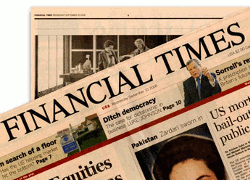Financial Times: Belarus’s salary dilemma
3- by Jan Cienski, Financial Times
- 23.02.2012, 10:43

Alexander Lukashenko wants average salaries in Belarus to go up – and what the authoritarian leader wants, he usually gets, which is likely to mean more trouble for the ex-Soviet republic’s battered economy.
“What is the average salary of $500? This is quite a low level – we should get higher. And this is a task for everybody,” Lukashenko told local officials this week, according to the local press.
However, cranking up salaries in a bid to gain popularity before the December 2010 presidential election was one of the reasons that Belarus fell into a balance of payments crisis in 2011, forcing a steep devaluation of the Belarusian rouble and a desperate turn to Russia for financial aid.
Emergency loans from the Russian-led Eurasian Economic Community, plus the sale of Beltransgaz, the half-owner of natural gas pipelines that carry Russian gas to western Europe across Belarus, to Russia’s Gazprom for $2.5bn, helped end the government’s cash shortage.
In the end, the rouble shedding about two-thirds of its value helped bring the economy back under control, wages fell back into line with labour productivity, imports fell and exports rose, says Alexander Chubrik, head of the IPM Research Centre economic policy think tank in Minsk, who was speaking in Warsaw on Wednesday.
The Belarusian economy managed to grow by 5.3 per cent last year, but there are worrying signs that the boost given by the devaluation is running out of steam – growth in the fourth quarter came to zero, the centre says.
That leaves Lukashenko with a series of unpalatable options.
The first is pushing hard for short term growth, but at the cost of long-term stability. As wages rise, competitiveness would again fall, driving down exports and within a short period setting off another devaluation crisis, says Chubrik.
A second scenario sees the the central bank cutting interest rates to goose growth, which sends inflation (clocking in at 108 per cent in the fourth quarter) spiralling, and the rouble shooting up, again hurting exports and leading to another devaluation.
The final scenario, of which Chubrik says “the odds of it happening are not zero”, calls for liberalising salaries, ending subsidies for energy, housing and agriculture, privatising state assets and getting the central bank to switch to inflation targeting.
The result could draw in western investment, lessening Belarus’s dependence on Russian and Chinese capital, and set the economy on a stable course of growth.
That sounds pretty much like what the IMF has been calling for. An IMF mission is again in Mink this week, but previous attempts to restart talks on an aid programme foundered over the Belarusian government’s lack of commitment to just such a package of reforms.
The indications are that Lukashenko – faced with a restive population after stealing the presidential election – is not planning to let the levers of economic control out of his hands anytime soon.
Earlier this month he commanded that Belarusians not see any increase in housing costs this year . At the moment, the housing ministry says that monthly rents paid by Belarusians are only covering about 17 per cent of their living costs.
Looks like the invisible hand will remain very visible for the foreseeable future.










